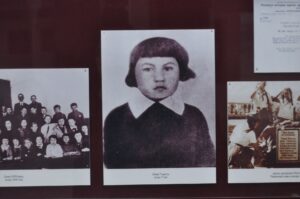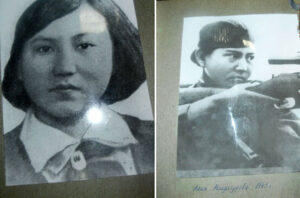ASTANA – At the age of 18, Aliya Moldagulova, a skilled Kazakh sniper, gave her life defending her homeland from the Nazi invasion during World War II. As Kazakhstan marks Moldagulova’s 100th anniversary, it presents an opportunity to go beyond commemorative events and explore the courage and character of a young, strong, and brave Kazakh woman, who became a symbol of resilience on the frontline.

Aliya Moldagulova, a skilled Kazakh sniper. Photo credit: wikipedia
Childhood marked by loss and orphanage
Moldagulova was born in the Bulak village of the Aktobe Region. While the exact dates of her birth vary from source to source, she is stated to have been born in 1925.

Aliya Moldagulova in her childhood, 7 years old. Photo credit: Sputnik/Aiguzel Kadir
Eight-year-old Moldagulova’s life was divided into a “before” and “after,” when her mother, gathering leftover spikelets in a potato field, was tragically killed by a stray bullet fired by a watchman. After his wife’s death, Aliya’s father was left to raise their two children, Bagdat and Aliya, on his own. Unable to care for them on his own, he brought the children to live with his sister’s family.
When Bagdat later died of illness, he took Aliya to her maternal uncle, Abubakir Moldagulov, in Aktobe. Within a year, Moldagulova became an unofficial orphan and was forced to leave the only home she had ever known. Fortunately, her new family welcomed her with love and care.
In 1935, when Moldagulova was 10, her uncle Abubakir enrolled in the military transport academy in Moscow, and the family moved with him. They later relocated to Leningrad, now St. Petersburg, as the academy transferred. In 1939, due to family circumstances, he placed 14-year-old Aliya in the orphanage.
Preparing for the front
In 1942, Moldagulova enrolled at the Rybinsk Aviation Technical School, but just three months later, driven by a sense of duty, she applied to the military commissariat. After persistent requests, she was accepted into a women’s sniper training school near Moscow.

By December 1943, Moldagulova completed a six-month program and was sent to the front. Photo credit: nomad.su
By December 1943, Moldagulova had completed an intensive six-month program and was immediately deployed to the front. She joined the fourth battalion of the 54th rifle brigade, stationed near the town of Kholm in the Kalinin Region.
What really amplifies the enormity of her actions is that she volunteered, knowing the risks. A top student at the sniper training school, she was offered a position as an instructor, but she refused, firmly insisting on being sent to the frontlines. Moldagulova was determined to serve in combat. In her letters, she wrote of a deep desire to avenge the friends she had lost on the battlefield.
Moldagulova’s final battle
It all took place on Jan. 14, 1944, in the village of Kazachikha in the Pskov Region, during the battle to liberate it from the Nazi occupation. That night, Moldagulova carried out a heroic act that will forever carve her name in history.

Letter from the Hero of the Soviet Union, Aliya Moldagulova, to her sister Sapura. 1943. Credit: e-history.kz
During the battle to liberate the area, 18-year-old Moldagulova led her fellow soldiers into the fight six times under heavy fire. Their battalion, supported by snipers, was tasked with cutting the Novosokolniki-Dno railway and capturing the village of Kazachikha.
In a company where the officers had been put out of action, Moldagulova assumed the role of the commander. She actively participated in the fighting, firing from cover, but was eventually wounded in the stomach.
Her comrades managed to carry her out of the combat zone and took shelter in a nearby shed. However, it was soon targeted by artillery and caught on fire. Moldagulova died there, along with all those who had sought refuge with her. After the war, the remains of the dead were reburied in a mass grave with military honors.
During her military service, Moldagulova killed 78 enemy soldiers and officers. On June 4, 1944, she was posthumously awarded the title of Hero of the Soviet Union. She was also awarded the Order of Lenin.
Forever heroine
A century later, honoring her heroism still feels like trying to put a value on something beyond measure. Moldagulova often wrote letters to her cousin Sapura, sharing her dreams, hopes, and the details of her daily life. In the letter below, she wrote about missing home and her longing to return—a dream that, sadly, never came true.
“I will imagine as if I live together with you there in my native Kazakhstan, although we are many kilometers apart. Oh! How I would like to see you, to visit my native auyl [village]! But! It’s fine, the time will come when we will celebrate our reunion, our return to our homeland and victory – all that at once!”


